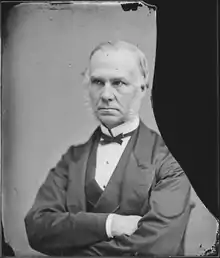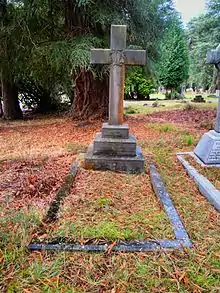Edward Thornton, 2nd Count of Cacilhas
Sir Edward Thornton GCB PC (13 July 1817 – 26 January 1906) was a British diplomat who held posts in Latin America, Turkey, Russia, and served for fourteen years as Minister to the United States.[1]
The Count of Cacilhas | |
|---|---|
 | |
| British Ambassador to the Russian Empire | |
| In office 1881–1884 | |
| Preceded by | The Earl of Dufferin |
| Succeeded by | Sir Robert Morier |
| British Envoy Extraordinary and Minister Plenipotentiary to the United States | |
| In office 1867–1881 | |
| Preceded by | Sir Frederick Bruce |
| Succeeded by | Lionel Sackville-West |
| British Envoy Extraordinary and Minister Plenipotentiary to the Emperor of Brazil | |
| In office 1865–1867 | |
| Preceded by | William Dougal Christie |
| Succeeded by | George Buckley-Mathew |
| British Minister Plenipotentiary to the Argentine Confederation | |
| In office 1859–1865 | |
| Preceded by | William Dougal Christie |
| Succeeded by | George Buckley-Mathew (as Minister to the Argentine Republic) |
| Personal details | |
| Born | Edward Thornton 13 July 1817 London |
| Died | 26 January 1906 (aged 88) London |
| Relations | Edward Thornton (grandson) |
| Parent(s) | Edward Thornton, 1st Count of Cacilhas Wilhelmina Kohp |
| Education | King's College London |
| Alma mater | Pembroke College, Cambridge |
Early life
Thornton was born in London on 13 July 1817. He was the eldest son of Sir Edward Thornton, 1st Count of Cacilhas, also a diplomat, who for many years held the post of British Minister to Portugal.[1]
Thornton was educated at King's College London, and at Pembroke College, Cambridge.[1][2][3]
Career
He entered the diplomatic service as attaché to the mission at Turin in the Kingdom of Sardinia in 1842, filled the same position in Mexico in 1845, and was made Secretary of Legation in that Capital in 1853.[1][3] Thornton did much to forward the conclusion of the Treaty of Guadalupe Hidalgo in 1848.[3]
On his father's death in 1852,[4] Thornton became 2nd Count of Cacilhas (also "Cassilhas").[5] Also in 1852, he was appointed Secretary of Legation at Buenos Aires, and chargé d'affaires to Uruguay in 1854.[3] He was appointed Minister to the Argentine Republic in 1859, and to the Empire of Brazil in 1865.[1]

In November 1859, Thornton ordered the Royal Navy to attack the Paraguayan war steamer Tacuari, which future president Francisco Solano López was on, to pressure his father president Carlos López to release a British citizen from prison.[6] This was one of several incidents that damaged Paraguayan relations with Britain. Thornton would later apologise for the action to repair relations, and promised Britain had no intention of interfering with Paraguayan jurisdiction. His actions were used in a House of Commons debate on a potential war with Brazil, with William "Seymour" Vesey-FitzGerald calling him "a gentleman who knows how to conciliate... that it is not his duty to 'read lessons' to foreign Governments" as an attack on Brazilian consul William Dougal Christie, while opposing MP Layard pointed to Thornton as proof that Britain did not take a "high hand" with Latin American nations. At the time, there was a belief that Latin American states were constantly embroiled in tensions and would cause strife for foreign governments.[7]
After the war scare with Brazil was averted, another major geopolitical conflict embroiled South America – the Paraguayan War. Brazil, Argentina and Uruguay signed the Treaty of the Triple Alliance, which united all three nations against Paraguay.[8] According to American historian Pelham H. Box, Argentine foreign minister Rufino de Elizalde informed Thornton that the Argentine government had no wish to annex Paraguay, but hoped that in the long term Paraguay might voluntarily join the Argentine Confederation (as was contemplated by Article 13 of the Argentine Constitution). He also informed Thornton that the Argentine Congress feared the provisions in the Treaty might prevent such an occurrence.[9] After the war concluded, Thornton was withdrawn from his position, having concluded several agreements during his tenure.[10][11]
Minister to the United States

Thornton's lengthiest assignment was as Minister to the United States, a position he held for fourteen years (1867–1881).[1] In 1871, Thornton served as a member of the commission on the Alabama Claims, and was appointed Privy Councilor.[1] Thornton served in 1873 as an arbitrator in the commission on the Mexican and United States Claims.[1][3]
Ambassador to St Petersburg
In 1881, he was appointed Ambassador at St. Petersburg.[1][3] For his services Thornton was invested Knight Grand Cross of the Order of the Bath in 1883.[1][3] A year later Thornton received his last appointment, Ambassador at Constantinople, a position he held for three years before retiring "on a pension" in 1887.[1][3]
Personal life
In 1854, Thornton married Mary Jane (née Maitland) Melville (1827–1907), at St Peter's Church, Eaton Square.[12] Mary, the widow of Andrew Melville of Dumfries and a daughter of John Maitland and Frances MacKenzie (née Dalyell) Maitland.[13] Together, they were the parents of:[14]
- Edward Thornton (1856–1904),[15] who married Emma Jessie Rawson, the younger daughter of Philip Rawson of Woodhurst, Crawley, in 1889. After his death, she married the Rev. Edward Douglas Lennox Harvey and became the mother of Capt. Roger Harvey.[16]
- Mary Grace Thornton (1858–1926), who died unmarried.
- Frances Evelyn Thornton (1859–1936), who married Mr. Elsey.
After a lengthy illness, Thornton died at his London residence, 5 Tedworth Square, on 26 January 1906.[1] He is buried in Brookwood Cemetery. As his son and heir, diplomat Edward Thornton (born 1856), had died in 1904,[15] the title of Count of Cacilhas passed to his grandson, Edward Thornton.[5]
References
- "Death List of a Day. Sir Edward Thornton." The New York Times, 27 January 1906. Pg. 9. Accessed: 18 July 2009.
- "Thornton, Edward (THNN834E)". A Cambridge Alumni Database. University of Cambridge.
- Henry Robert Addison, Charles Henry Oakes, William John Lawson, Douglas Brooke Wheelton Sladen, ed. Who's Who: An Annual Biographical Dictionary, Page 1617 – London: Adam and Charles Black, 1904
- "DEATH OF SIR EDWARD THORNTON". The Birmingham Daily Mail. 26 January 1906. Retrieved 28 July 2023.
- Burke's Great War Peerage, Burke's Peerage and Gentry (UK) Ltd, 2008 [a reprint of A Genealogical and Heraldic History of the Peerage and Baronetage, 76th edition, ed. Ashworth P. Burke, Harrison & Sons, 1914], p. 2112.
- TRATADO DE LAS PUNTAS DEL ROSARIO (Guerra del Paraguay) (in Spanish).
- Commons Sitting – BRAZIL.—PAPER MOVED FOR −887 Hansard 16 July 1863.
- Lettsom to Earl Russell (1866). "Treaty of Alliance against Paraguay". Accounts and Papers of the House of Commons: Thirty-Nine Volumes: Session 1 February — 10 August 1866. Vol. 76. House of Commons. pp. 79–83. Retrieved 23 November 2019.
- Box, Pelham Horton (1930). The Origins of the Paraguayan War. Urbana, IL: University of Illinois Studies in the Social Sciences.
- Katra, William H. The Argentine Generation of 1837: Echeverria, Alberdi, Sarmiento, Mitre, page 261. Fairleigh Dickinson University Press, 1996.
- Historia General de las relaciones internacionales de la República Argentina (in Spanish).
- Annual Register of World Events | Annual Register, 1854. Marriages. 1855. p. 244. Retrieved 28 July 2023.
- "DEATH OF SIR E. THORNTON". The Daily Telegraph. 27 January 1906. Retrieved 28 July 2023.
- Fox-Davies, Arthur Charles (1910). Armorial Families: A Directory of Gentlemen of Coat-armour. T.C. & E.C. Jack. p. 1593. Retrieved 28 July 2023.
- "OBITUARY. Mr. Edward Thornton". The Times. 29 August 1904. Retrieved 28 July 2023.
- Burke, Bernard (1925). A Genealogical and Heraldic History of the Landed Gentry. Burke Publishing Company. p. 1482. Retrieved 28 July 2023.
External links
- Sir Edward Thornton Correspondence with the British Foreign Office. General Collection, Beinecke Rare Book and Manuscript Library, Yale University.
![]() This article incorporates text from a publication now in the public domain: Gilman, D. C.; Peck, H. T.; Colby, F. M., eds. (1905). "Thornton, Sir Edward". New International Encyclopedia (1st ed.). New York: Dodd, Mead.
This article incorporates text from a publication now in the public domain: Gilman, D. C.; Peck, H. T.; Colby, F. M., eds. (1905). "Thornton, Sir Edward". New International Encyclopedia (1st ed.). New York: Dodd, Mead.